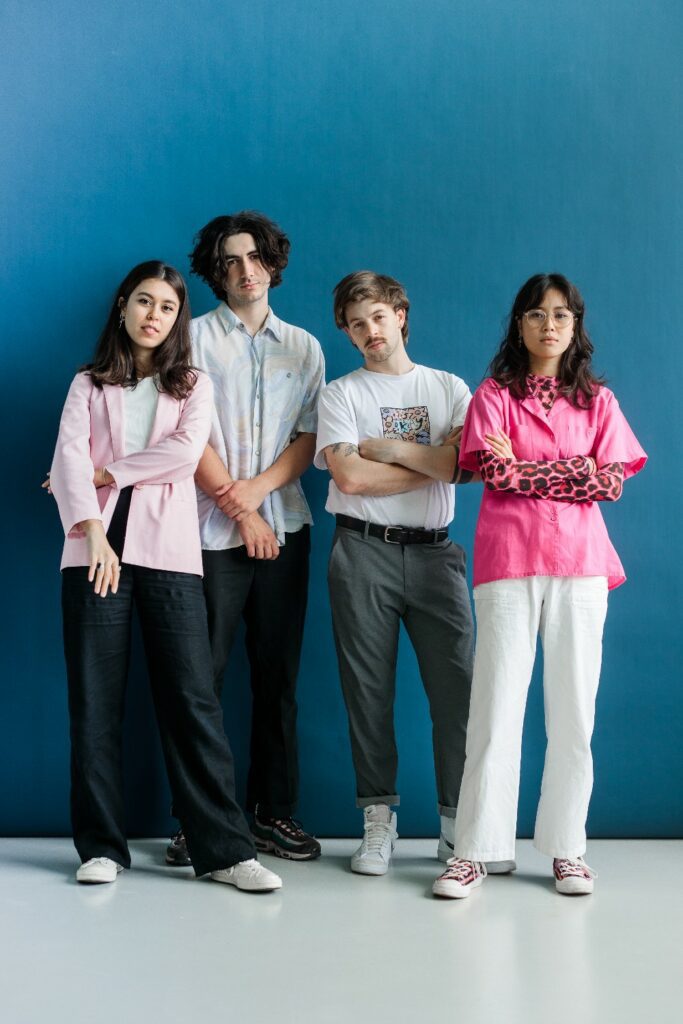

Sydney-based quartet Coconut Cream is on a smooth, sweet transcendence into public consciousness. They’ve just released their sophomore EP What Kind Of Music Do You Like To Listen To?, a six-song showcase of their gorgeous, jangly, shoegaze vibe, with ancestral roots in nineties indie bands like Lush and Slowdive.
The foursome formed quickly after meeting at the Sydney Conservatorium of Music in 2018. Songwriter/vocalist Astari Mudana remembers, “Given it was the first year at a music school, I was very keen to get something going.”
So keen, she barely waited a week. “The first day that you met me, you asked if I wanted to start a band with you,” laughs drummer Jasmine Tan. “And I didn’t really think that we were going to eventuate because I was like, this girl just met me and she’s asked me to be in a band, I don’t know how real that is! We organised a jam session the week after, and we played just the two of us and it built from there.”
Bassist Chad Kennedy and guitarist Oscar Saran were already friends. “When we all came together, we all developed our own little friendships,” says Kennedy. Those friendships – as they readily admit – have only strengthened through being constantly in each other’s pockets. “We have grown really close as a band because we spend a lot of time together.”
Mudana and Tan came up with the band name on a trip to Melbourne, when they went out on the town for an extended tour of the city’s bars. “We’d been struggling for and name and not everyone could agree on the same thing and it was tearing us apart,” Tan says. “We ended up in this cocktail bar – we were pretty intoxicated by then – and Astari was reading the menu and she exclaimed ‘What about Coconut Cream? For the band, Coconut Cream?’”
Nobody hated it, and thus, it stuck. They debuted in 2019 with single “Laney,” then their debut EP Out of Touch, making family of a diverse gang of four.
“We all grew up in different places and obviously, that made our listening journeys quite different,” says Tan. “Chad’s from South Africa, I grew up in Papua New Guinea, Astari’s dad is Balinese and her mum’s Australian…”
And Oscar?
“I’m pretty standard Australian. I grew up in the hills in Hornsby [North of Sydney in New South Wales],” says Saran.
Those diverse musical and cultural heritages may result in a more exploratory album in future, but their sophomore EP reveals the shared musical language they all united in: a deeply dreamy, confessional, hazy dreampop informed by skilled, nuanced melody and harmonies. After releasing stand-alone single “Fairy Bread” in 2020, they put releasing new music on hold; What Kind Of Music Do You Listen To? feels like a big, relieved, joyful exhale.
“A couple of the tracks on the EP we wrote a while ago from our old repertoire, and the rest we all wrote in the past two years and just built up a bunch of tracks over time,” says Mudana. “We had a bunch of songs that we really loved, then we culled them down to the six on the EP. Now they all kind of seem a bit old to us because the EP has been pushed back so much, but to everyone else they’ll be new.”
Tim Fitz, bassist for Middle Kids (winners of Best Rock Album in last year’s Australian Record Industry Awards for Today We’re The Greatest) took on production duties for the EP. “After the first lockdown in Sydney we were able to meet up and record with Tim at the end of 2020,” explains Kennedy. “Tim has a little home studio with all this gear he’s collected over time. It’s a super fun place to record in.”
“Having a week, we literally did every single instrumental thing in a week and that in itself is quite hard,” adds Mudana.
Tan is more confessional. “There were a lot of dark moments but it turned out good. I think it’s being in a creative space for a concentrated amount of time, there’s a lot of pressure and tension in the air but it’s all pushing to get it all done.”
Fitz is not the only big name associated with the EP. It’s the first album they’ve released on Broth Records, a new imprint from ex-Gang of Youths guitarist Joji Malani. Says Saran, “It’s a funny story how we met Joji. Basically, he messaged us on Instagram. He asked if we were playing any shows anytime soon.” They were playing that night. Malani made it to the show on short notice, and after attending a few more of their gigs (and arranging meetings in which he was vague about how he might work with them), he organised for a session with Fitz.
Their first single on Broth Records was jangly, poppy number “Your Drug On Computers,” an homage to Mudana’s teenage years. It’s gorgeously nostalgic in its throwback to surfer-meets-shoegaze ’90s indie pop, as if constructed from bubblegum, worn out sneakers and melting ice cream. “Our label felt was the strongest track to kick off the EP with, which is why we released it as a single,” says Tan.
“Not necessarily the strongest,” counters Saran, “but the most ‘get-things-up-and-going’ type deal.”
“It’s just a fun one,” Mudana says, and she’s nailed it.
The second single, “Safety Net,” arrived in November, both solidifying their songwriting prowess and taking a more melancholic swerve. The starry-eyed, dewy freshness of their melodies and harmonies remains a golden thread weaving all their varied expressions to the one plumb line.
“I feel like we’ve worked out a songwriting style that works,” Mudana says. “I write the basis of the track on acoustic guitar and vocals then I take it to the band and we just get a feel of the song, what vibe and feel we want it to have, the time signature. Then everyone writes their parts around what I’ve written. Most of the time, it comes together pretty quickly and we all fit together.”
“Safety Net” builds slowly with the spotlight firmly on Mudana’s voice – technical, emotive, somehow both grounded and spine-tinglingly intimate. Immersive, echoing guitar feels like a shimmering cocoon of sound in which Mudana’s somehow singing just for you. The echoey harmonics (a la Lush’s “Sweetness and Light”) give a warm, sunset feeling to the lamenting lyrics, which detail the all-too-common story of inviting a past lover to come upstairs even though you know it can’t and won’t heal all the scars of your shared past: “You start to cry you missed this/And I said I’m not sad anymore/Then you tell me what I’ve been waiting for/I know I seem fine but I’ve got too much time.”
“All the tracks are personal stories of my own,” admits Mudana. “They all are a bit different and talk about different things: heartbreak, or falling in love, or breaking up, all those kind of themes. They’re just songs I hope people can relate to even though they’re personal and specific. In terms of presenting them to the band, the band all literally know my love life stories, freakin’ everything! There’s nothing to hide. I’ll write a song and Jas will be like ‘I know who this is about.’”
Tan pipes in, “When I first heard it, I really loved it because it was beautiful. We’d been trying to write a more upbeat, more poppy, dance type song. Astari came to me with this and I said, ‘Oh my gosh, it’s so sad and beautiful as it is, we can work on it.’ The drum part came last because I was struggling a lot with how to fit my part into the song since the bass and guitars sounded so beautiful and I didn’t want to bang on them. Chad helped a lot with that drum beat, so I think we came up with that one all together. The verses I had a vision for the vibe but the chorus I was struggling with a lot.”
Saran ended up cutting his original guitar part. “I feel like it didn’t serve the song. We reworked it when we were recording, and it’s been through a lot of renditions,” he says. “I feel like that song is a stream of emotion, quite direct, and you don’t want to get in its way, so there’s a lot of textural slide guitar bits that can fill out space and complement Astari’s vocals.”
Kennedy’s bass was intentionally minimal. “It was such a beautiful song, I didn’t want to do too much on it. I knew the chorus was gonna build up, but I wanted to keep it simple and groovy because the verses are so lush and beautiful. I wanted my part to sit there and create a rhythm rather than something melodic.”
While they all miss playing live, there’s something special about putting their songs down for posterity and enabling the world to unfurl them at their own pace, in their own way, as Tan describes: “With the recordings, it’s like a present. You open it up and get something new every time.”
With their luscious, romantic sophomore EP, Coconut Cream has given a gift that will surely keep on giving.
Follow Coconut Cream on Facebook and Twitter for ongoing updates.

